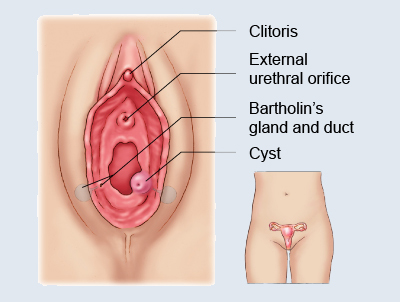Most women don’t know about the existence of their Bartholin glands unless they cause problems. These glands are located near the vaginal opening on both sides, thus they are at increased risk of becoming infected. When bacteria enters the Bartholin duct it can become inflamed and may block the gland from emptying properly. As a result the gland itself can become inflamed and form an abscess.
The condition is often very painful and may cause fever. When the ducts are blocked but there is no sign of inflammation it is treated as a cyst.
The usual treatment for this type of problem is surgery. It should be performed only if the abscess or cyst causes symptoms or becomes uncomfortable.



